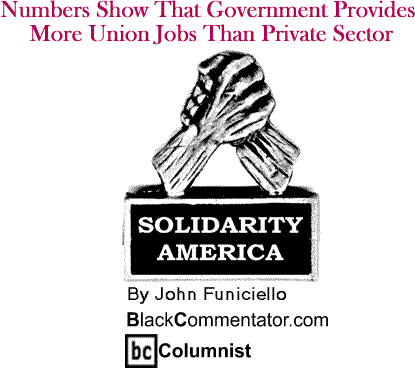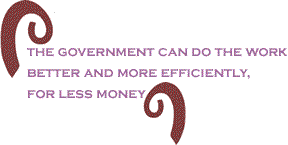
|
||||||||||||||||||||||
|
||||
 |
||||
Probably
no one ever has expressed such contempt for something that he
was about to become the head of as the 40th president of the
According to a Rasmussen Reports poll of about a year ago, 59 percent of those polled agreed with Reagan�s assessment of government, while only 28 percent disagreed and, presumably, saw good in what the government does. No wonder, then, that so many civic, business, and political leaders have taken up the call for less government and more privatization, although it can be shown that the privatization of public services doesn�t save any money and simply provides shortcuts for the ruling corporations to move the money from taxpayers pockets into company coffers. Corporate
But that�s what is happening. At any given level of government, services A-F are privatized and a certain number of public workers lose their jobs. Then a private company is created to provide those services and workers are recruited to work at much lower wages - and likely, as well, no benefits-and the profits go to the private firm. Since there is little competition for providing those services, within a short time, say, a few years, the price for doing the �contract work� keeps going higher and higher. By then, the government no longer can provide the services they once did and, no matter how the private contractor gouges the city or county or village, the government pays.
Ideologues
like Reagan and those who would raise him to sainthood (there
was a modest-and, fortunately, failed-effort to have a statue
of The Gipper placed in every county in the They hardly know what they�re saying, since they use government services virtually every minute of every day, starting with the water for their coffee, to the weather report from the National Weather Services, to the highways, to the public health service, and a few thousand other things. Nevertheless, they want to cut government�s involvement in much of our daily lives and let the private sector do it. The private sector�see how it benefits the people: just think about the oil industry, cable and satellite television, utilities, banks that safeguard our money, credit card companies that can add a $10-$30 fee (for nothing) to the bills of millions of customers, most of whom don�t even notice. One card company said they could do it because the banks �allowed� them to do it and, besides, �it�s legal.� If you catch them, they�ll remove the fee, but if you�re just too busy to notice, they will leave it there and you�ll pay it, and �Sorry for the inconvenience.� That
which emanated from the financial and political power centers
(and it�s ironic that politicians would bash government, living
as high off it as they do) now emanates from The number of Americans working in union jobs is a good indicator of how the economy is going, because, for generations, unions have set the scale for general wages and benefits in most industries. The number of jobs held by union members has declined, but so has the number of jobs, generally. Something
of a watershed was reached in 2009, as the number of union workers
employed by various levels of government and school districts
outnumbered the union members who work for private companies.
Right now, government is one of the stable elements in The U.S. Bureau of Labor Statistics reported in January that government workers made up 51.5 percent of union members in 2009. Unionized government workers made up just 48.7 percent a year earlier. Less than half of the 15.3 million unionized workers were employed in the private sector. In
recent decades, and continuing today, during this �Great Recession,�
corporations have shipped out their work to other countries, have
merged, downsized, and closed their
There was a time, before government workers were organized, that kind of work was pitifully compensated, compared with the private sector, especially manufacturing and industrial work. As the country began to shed those private jobs and public workers were allowed to join unions (not all states even today allow it, however) the pay and benefits began to rise, until now, when public workers are paid as well as the private sector. And,
at least one public sector union has shown that they do the work
better than the private sector. In In recent years, the Public Employees Federation (PEF) has reported that, at a time when the state is facing severe fiscal constraints, �spending on all consultants, including support staff, in (state fiscal year) 2008-09 rose to $2.9 billion-a $100 million increase.� The union, which represents 59,000 state professional, scientific, and technical workers, says the state pays �thousands of consultants�an average of $160,719 annually, 62 percent more than public employees doing similar work, including the cost of their benefits.� If private companies can do the work more efficiently, you�d never know it from these numbers. Public workers� unions have shown that the government can do the work better and more efficiently, for less money, but legislatures and the congress continue to contract-out or privatize government work, often to their friends or contributors to their campaigns. It looks as if the BLS report could be a portent of things to come. Government jobs will hold or increase in number, while private sector jobs will hold or decrease-because no one has found a way yet to send a highway maintenance job or a water plant operator�s job to another country. Eventually, Reagan�s comment about government at his first inaugural will be considered just another rightist rant-nothing more-because, if we�re paying attention, government belongs to the people and theoretically, we can bend it to our good use, if we work at it. BlackCommentator.com
Columnist, John Funiciello, is a labor organizer and former union
organizer. His union work started when he became a local president
of The Newspaper Guild in the early 1970s. He was a reporter for
14 years for newspapers in |
||||
 |
||||
If you would like to comment on this article, please do so below. There is a 400 character limit. You do not need a FaceBook account. Your comment will be posted here on BC instantly. Thanks. Entering your email address is not mandatory. You may also choose to enter only your first name and your location.
|
||||
Thank you very much for your readership. |
||||
| Any BlackCommentator.com article may be re-printed so long as it is re-printed in its entirety and full credit given to the author and www.BlackCommentator.com. If the re-print is on the Internet we additionally request a link back to the original piece on our Website. | ||||
| |
||||
Issue 362 |
| Executive Editor: Bill Fletcher, Jr. |
| Managing Editor: Nancy Littlefield |
| Publisher: Peter Gamble |
| Est. April 5, 2002 |
| Printer Friendly Version in resizeable plain text format |
 |
 |
 |

|
 |
| |
| |

































 The
community also loses indirectly, because the difference in pay
between the public (usually union) worker and the private (usually
non-union) worker goes into profits that are taken out of the
area and don�t make it into the stores, businesses, and non-profits
that benefited from the higher, public, wages.
The
community also loses indirectly, because the difference in pay
between the public (usually union) worker and the private (usually
non-union) worker goes into profits that are taken out of the
area and don�t make it into the stores, businesses, and non-profits
that benefited from the higher, public, wages.
 Government,
the �employer of last resort� has become the mainstay of many
local communities across the country. Put that together with the
health care industry-nursing homes and clinics-and you truly have
the mainstay of local economies. In the numbers released by the
BLS last month, unionized private sector membership plunged 10
percent, while public sector unions showed a slight increase.
Government,
the �employer of last resort� has become the mainstay of many
local communities across the country. Put that together with the
health care industry-nursing homes and clinics-and you truly have
the mainstay of local economies. In the numbers released by the
BLS last month, unionized private sector membership plunged 10
percent, while public sector unions showed a slight increase.








